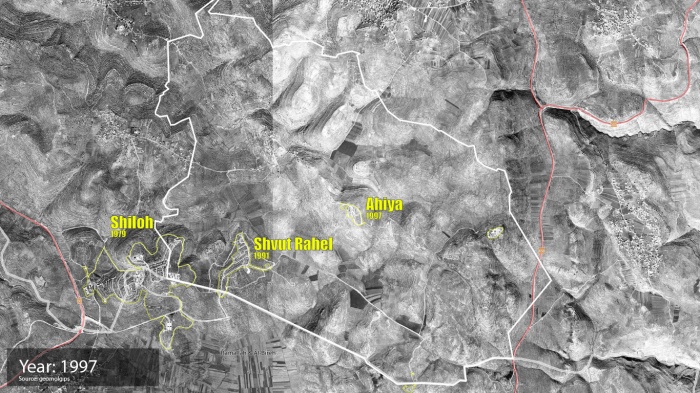| Date Ongoing | Publication 30 December 2024 | Location West Bank, Occupied Palestinian Territory |
| Forum Advocacy, Legal Process | In Coordination with Global Legal Action Network (GLAN) | Methodologies OSINT, Data Mining, Geolocation, Ground Truth, Mapping, Remote Sensing, Fieldwork, Pattern Identification |
| Area Israel's Settlement Enterprise, Land Confiscation, Settler Violence, Business and Human Rights | ||
| Launch Platform | ||
Abstract: In early 2023, Al-Haq Forensic Architecture Investigation Unit (FAI) conducted an in-depth investigation into Airbnb listings located in illegal Israeli settlements within the occupied West Bank. This investigation uncovered how Israeli settlers exploit resources and infrastructure systematically denied to Palestinians, including by using accommodation platforms like Airbnb and Booking.com, to sustain their illegal presence on stolen Palestinian land. We created an interactive web map showcasing hundreds of Airbnb listings that appeared on Airbnb.com between 2016 and 2023, alongside the boundaries of Israeli settlements illegally established on Palestinian land in the occupied West Bank.
Context/Background
The Palestinian village of Jalud is located in the northern West Bank, south of the city of Nablus. Illegal Israeli settlements and outposts have heavily disrupted the area and its residents. Since the 1980s, the Israeli Occupying authorities and settlers have confiscated Palestinian land for illegal settlement construction and expansion. Israeli settlers from nearby illegal settlements frequently subject Palestinian residents to harassment, attacks, and property damage, and the Israeli Occupying Forces (IOF) often impose movement restrictions on Palestinians, limiting their access to farmland, natural resources, markets, and basic services. FAI has compiled visual documentation of the violations committed by illegal settlers dating back to 2006, though the settler violence began long before.
In April of 2021, a video circulated widely on social media of Israeli settlers physically assaulting a Palestinian man near the village of Jalud to the south of Nablus. Source: Quds News.
“Vacation on the Hilltop of Al-Zurra’a”
One property located in illegally confiscated Palestinian land is rented through multiple accommodation platforms. The property is built on land belonging to Abdallah Haj Mohammed, a Palestinian resident of the village of Jalud. The property, marketed as “Vacation on Mount Keida”, is featured on a dedicated website “Knofesh.com”, and is situated within the illegal outpost of Kida, southeast of Jalud. According to Haj Mohammed, the property was first listed on Airbnb in 2018. However, Google Maps reviews for this property date back as far as 2016, suggesting its use predates its Airbnb listing.
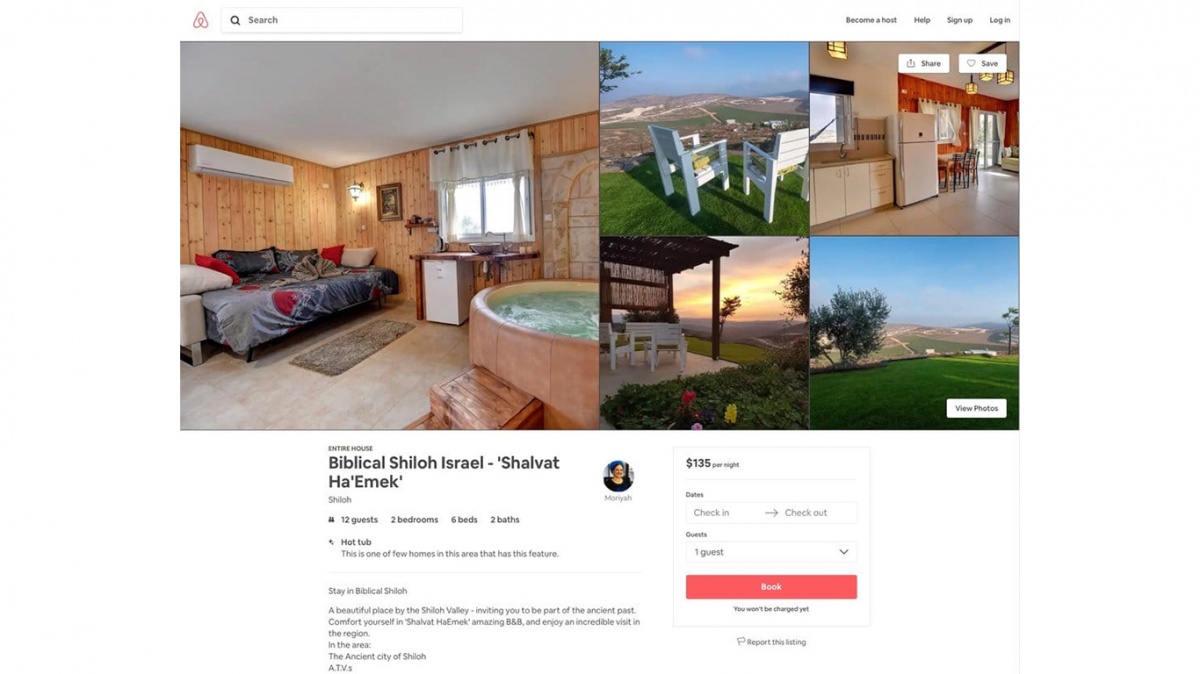
A screenshot of the listing for the two cabins by Maanit Rabinovich established on Abdallah Haj Mohammed’s Land. Source: Airbnb Website (2018).
The surrounding area near Jalud is dotted with numerous illegal listings, including resorts, lodges, cabins, and touristic attractions often advertised as tranquil getaways from the noise and bustle of urban life. While many properties are marketed as being in the illegal settlement of Shilo, our analysis identified at least four listings located specifically within the illegal outposts of Kida and Esh Kodesh, about three kilometres east of Shilo.
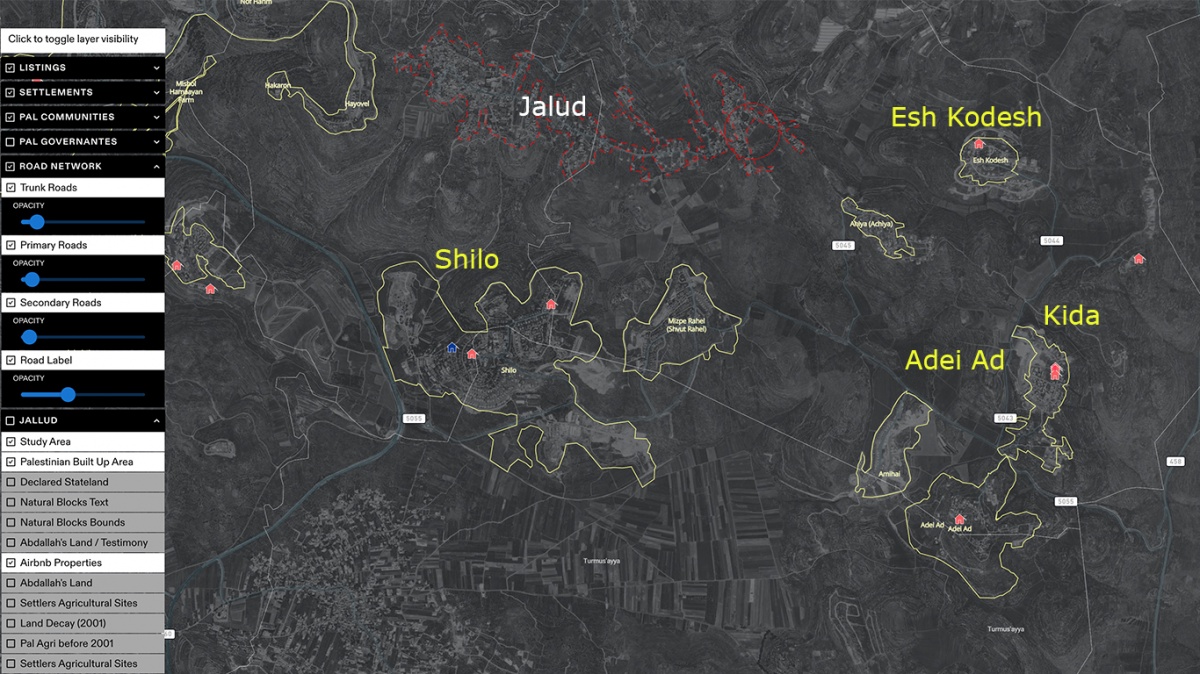
A screenshot of the Al-Haq Settlement Watch Platform showing the distribution of Airbnb listings in red around the Palestinian village of Jalud (2023).
Source: https://settlement-watch.alhaq.org/
The expansion of settlements and outposts near Jalud has significantly accelerated since the establishment of the Adei Ad settlement in 1998. Residents of Jalud report that, during the late 1990s, Israeli occupation authorities actively restricted Palestinians from accessing and cultivating their lands, stripping them of vital resources and livelihoods, as is the case of Abdallah Haj Mohammed.
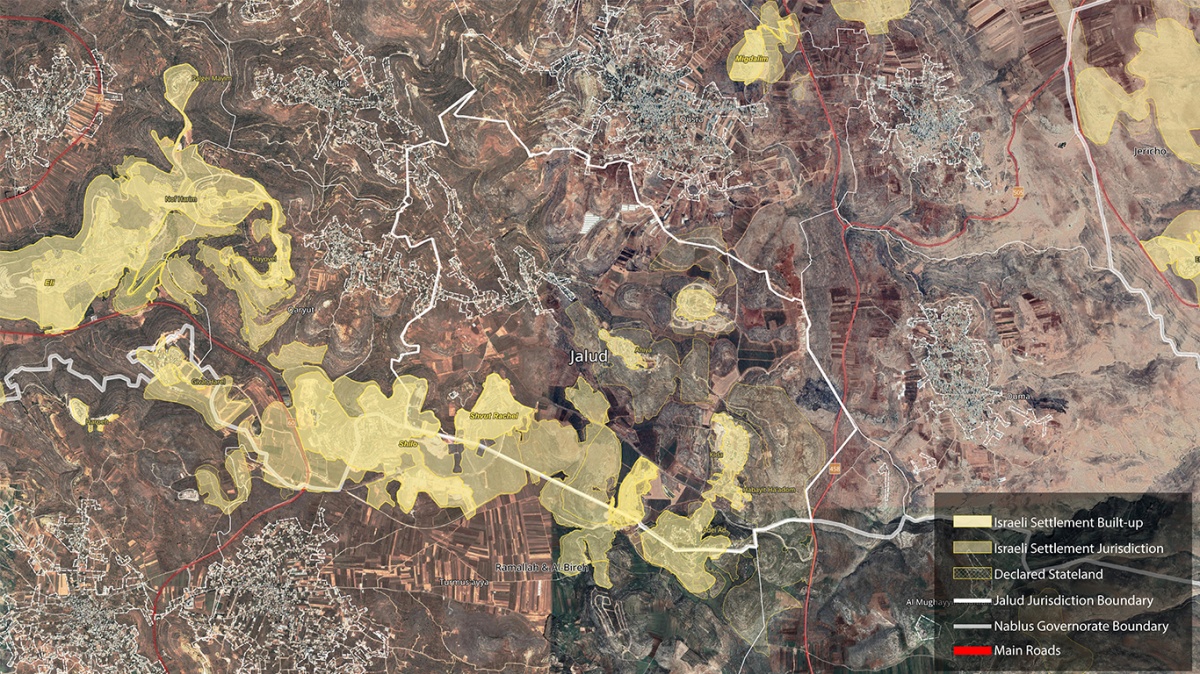
A map illustrating the boundaries of Jalud village alongside the jurisdiction areas of nearby illegal Israeli settlements (2023).
Source: geomolg.ps
We identified Abdallah Haj Mohammed’s land parcel as part of Natural Block No. 18, known as “Al-Zurra’a,” according to the village council’s masterplan. This agricultural land had long been a vital source of income for Abdallah and his father, who regularly maintained and farmed their land and primarily cultivated wheat and barley. However, in 1998, Israeli forces forcibly denied Abdallah access to the land, preventing him from continuing its cultivation and upkeep.
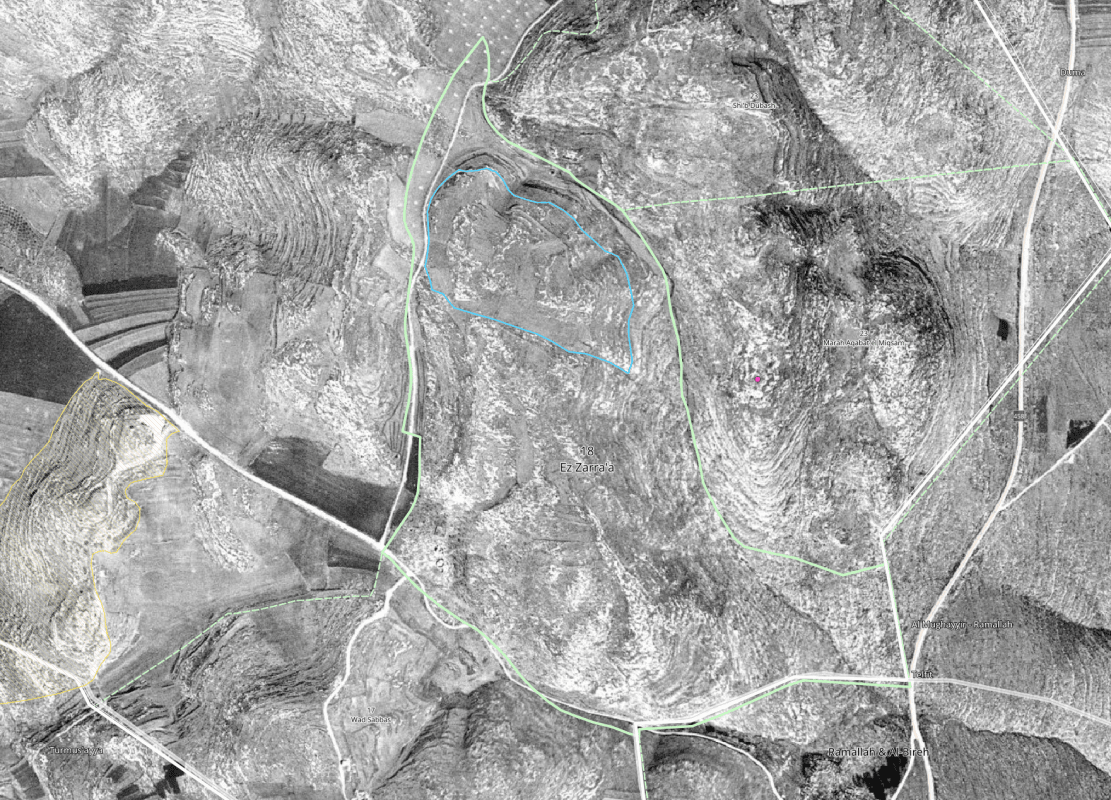
Aerial Image showing boundaries of Block No.18 (green) and SouthEast boundaries of Jalud (white) (2022). Source: geomolg.ps
We documented Abdallah’s testimony and analysed tax-related documents he shared with us. These records showed consistent tax payments for the land parcel during the British Mandate era. Using the information provided in the tax documents, we mapped the plot’s boundaries and monitored historical changes through aerial imagery, tracing the transformation of this land since Abdallah’s access was restricted in 1998.
Additionally, we conducted a series of interviews with Abdallah which helped us further refine the boundaries of his land within Block 18, identifying specific plots historically dedicated to agriculture. His Ikhraj Qeid documents - tax documents commonly used to prove land ownership, verify that the land spans 100 dunums, a measurement that aligns precisely with our mapped boundaries. These documents also highlight distinct areas of ploughed land, substantiating Abdallah’s claims.
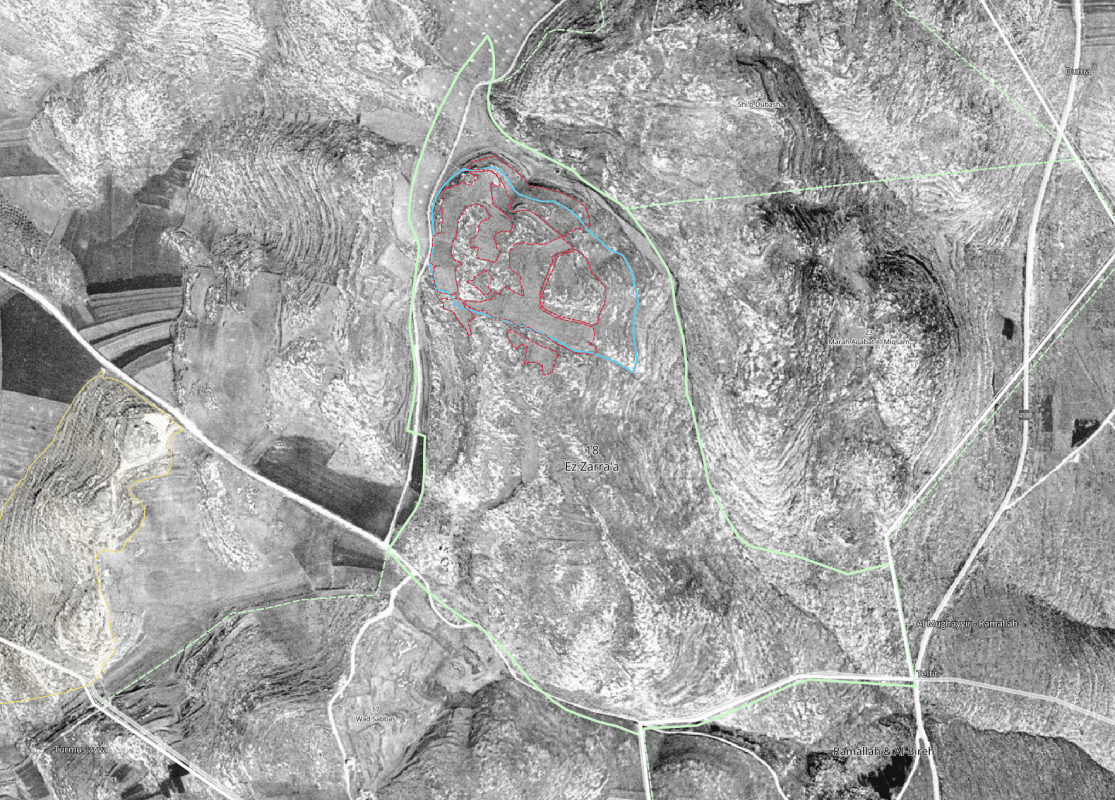
Aerial Image showing the agricultural part of Abdullah’s land (yellow) within Block No.18 (green) (1997). Source: geomolg.ps
The Israeli occupation authorities do not recognise Ikhraj Qeid documents as valid proof of land ownership. Instead, Israel distorts the applicable provisions of the 1858 Ottoman Land Code, under which the “reasonable cultivation doctrine” was developed, to be replaced by the so-called ‘50 per cent rule’. This misinterpretation of the law, in combination with other military orders and restrictions, has been utilised to dispossess Palestinians of their land. Under this doctrine, claimants must prove they have cultivated a substantial portion of the land— 50% of the parcel’s total area according to an Israeli Supreme Court decision. If at least 50% of the land is not cultivated, the entire parcel is declared State Land. Palestinians, like Haj Mohammad, are often prevented from accessing their land due to Israeli restrictions, including declaring large swathes of Palestinian land as ‘military area’ or ‘firing zone’, making cultivation impossible. It is then that the warped interpretation of the Ottoman Land Code is applied to confiscate private Palestinian land illegally. Prior to this denial of access, aerial imagery confirms that the Haj Mohammed family consistently maintained and cultivated the land, disproving any claims of neglect.
Furthermore, Israel’s interpretation of the local land code is contrary to international law2, as it effectively amends laws governing the occupied territory, which obliges the Occupying Power to respect the laws in force in the country while exercising measures to restore and ensure public order and safety[1], and prohibits conduct that results in altering the intrinsic characteristics of the occupied territory, including its demographic, cultural or social composition, including through population transfer into the territory.
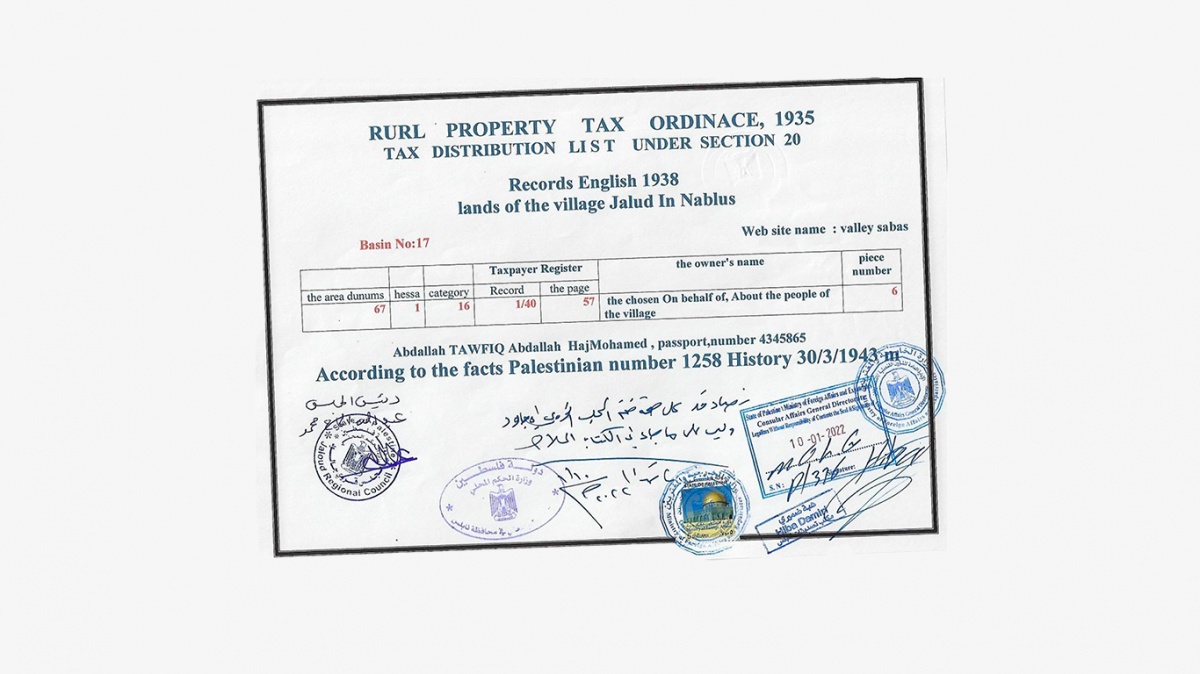
Tax document (Ikhraj Qeid) from 1935, dating back to the British Mandate era in historic Palestine, concerning the lands of Abdallah Haj Mohammad. Source: Abdallah Haj Mohammad
Following the Israeli occupation authorities' decision to restrict access to lands near Jalud, the area began to show clear signs of neglect and decay. By 2004, early indications of construction at the Kida outpost became apparent. Over time, construction activity intensified, leading to the outpost’s expansion and entrenching its illegal presence on Palestinian land. According to Peace Now, 2009 marked the first documented construction of 11 sites within the Kida outpost. This trend escalated in 2020, with 26 new construction sites added, and continued in 2022, with 19 additional sites built, further expanding the illegal outpost.
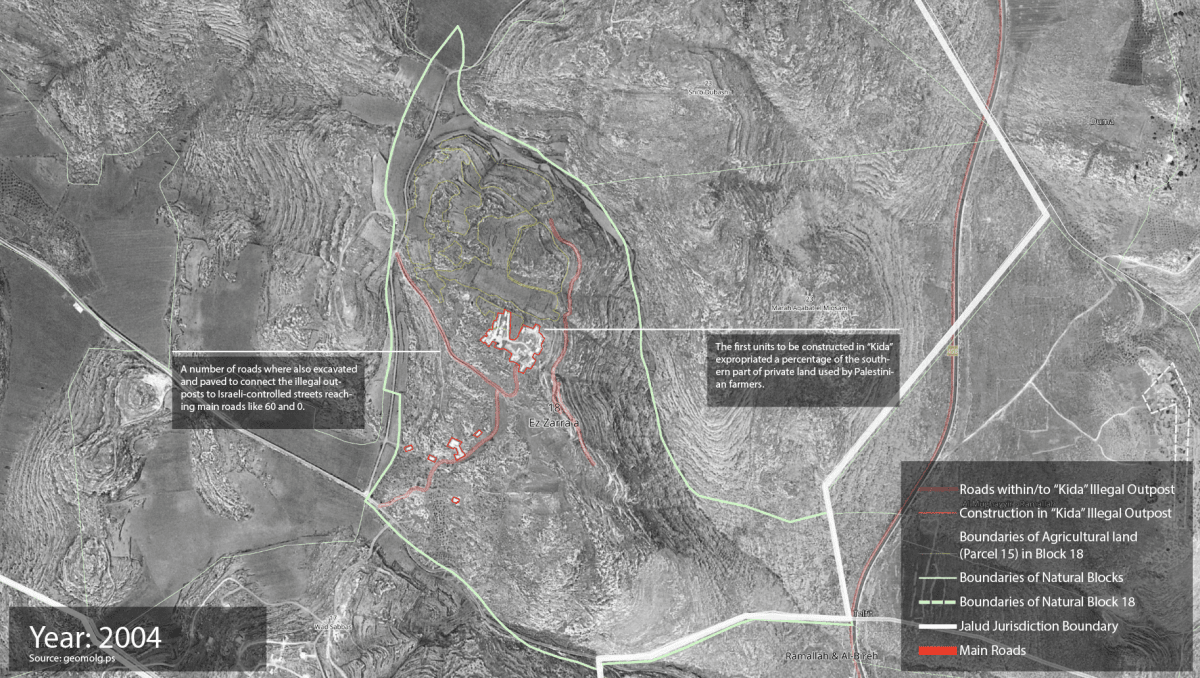
Aerial Image showing the first parts of the construction of the illegal Israeli outpost Keida (red) within Block No.18 (2004). Source: geomolg.ps
“Who Owns What”
While Airbnb hosts numerous listings for properties within illegal outposts and settlements in the West Bank, the listing on Abdallah’s land was removed by the platform in 2018. However, it reappeared intermittently on the site in the years that followed. Following Airbnb’s decision to delist such properties, Israeli lawyers filed a lawsuit against the company in Israel. Reports identify Maanit Rabinovich, the individual renting the property on Abdallah’s land, as the lead plaintiff in the case. Rabinovich is also the owner of Maanit Glass Art Studio and a kitchen, which is also located on Abdallah’s land. The studio advertises handmade jewelry, Jewish art pieces, and home decorations, and is promoted as a tourist attraction within the illegal outpost of Kida.
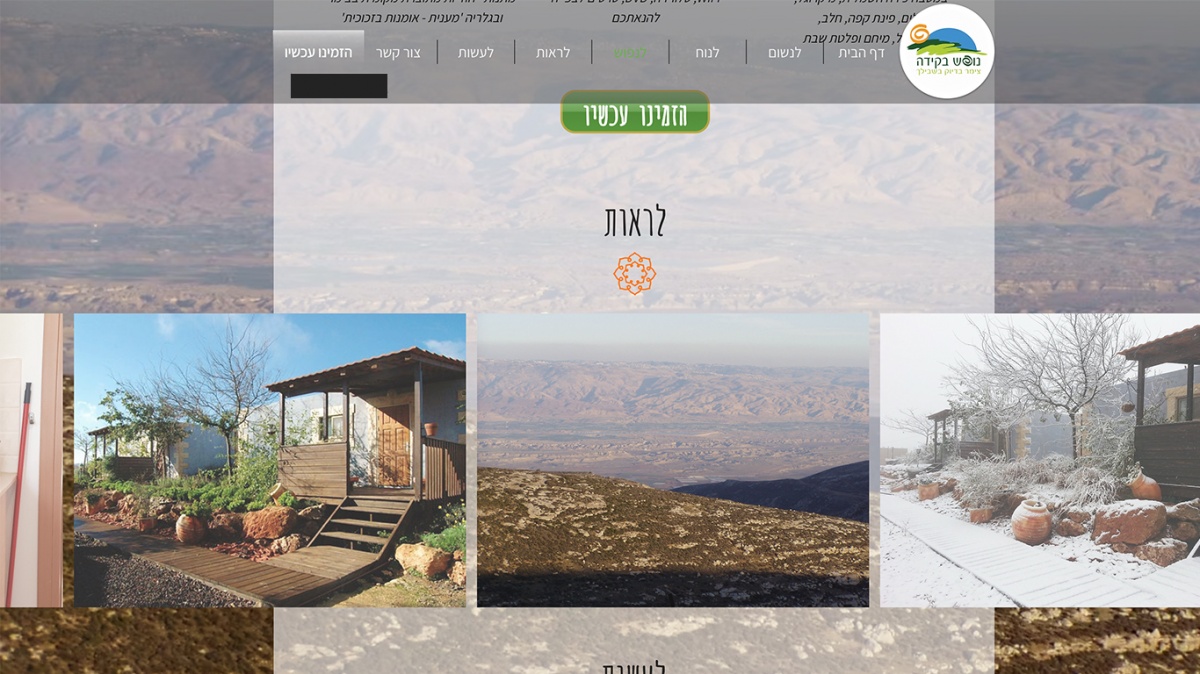
A screenshot of the b&b website that Maanit set up to rent her two cabins on Abdallah’s land (2024). Source: N/A
On her dedicated website, Maanit Rabinovich promotes the “Vacation on Mount Kida,” featuring two cabins described with enticing phrases like “start the morning with a cup of coffee, a magical view, and the silence outside—a moment just for yourself.” She also advertises her glass artworks as thoughtful gifts for guests and visitors. Intriguingly, the same website lists various tourist attractions for visitors to enjoy during their stay on this illegally appropriated land. These include the Gva’ot Winery, her glass art workshop, the Merlot Restaurant (featured on TripAdvisor) located in the illegal settlement of Shilo, a handmade soap shop, and a massage studio.
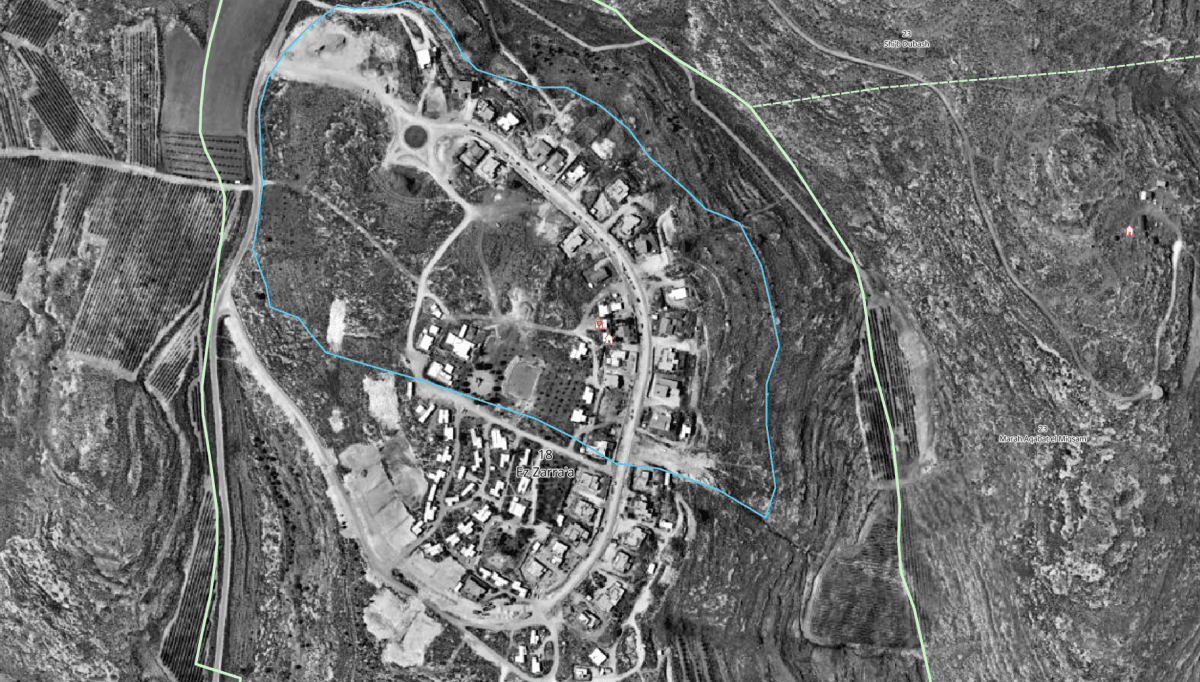
Aerial Image showing the first parts of the construction of the illegal Israeli outpost Keida (red) within Block No.18 (2004). Source: geomolg.ps
For example, the Gva’ot Winery is situated in the Givat Harel illegal outpost southwest of the Palestinian village of Qaryut. This highlights how tourism-focused Israeli settler businesses rely on international platforms like Airbnb and TripAdvisor to sustain and expand illegal settlements and outposts, leveraging tourism to reinforce their presence on occupied land.
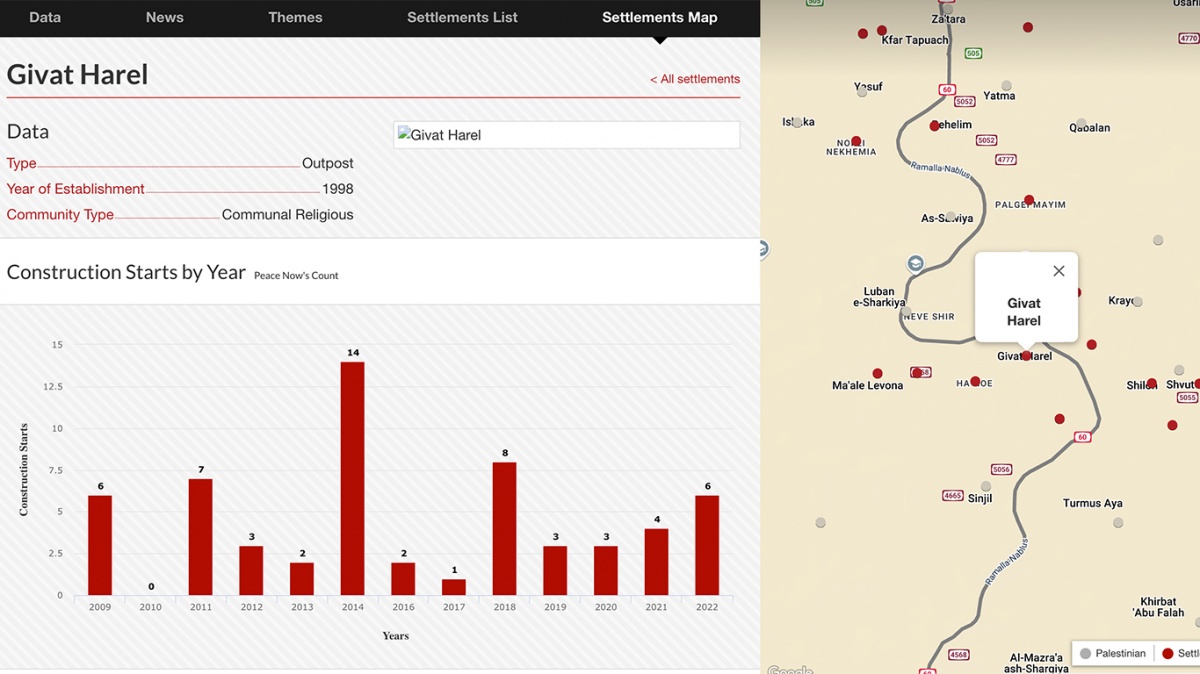
A visualisation showing the location of Givat Harel in relation to Turmus Aya near Jalud and the expansion rate of this outpost between 2009 and 2022 (2022).
Source: https://peacenow.org.il/en/settlements
Several listings on illegally expropriated Jalud land remain active on Airbnb. For example, one listing titled “Entire guesthouse in Shilo” managed by an account under the name Jonathon, is located on the northern edge of the hilltop of Shilo. Another listing appears in the Esh Kodesh outpost, with reviews dating back to 2021. Additionally, a dwelling in the Adei Ad outpost was previously listed on Airbnb by Israeli settler Moriya Shapira. In an interview with English-speaking Israeli media, Shapira expressed little concern about losing revenue from Airbnb, stating that while she may lose some business, she plans to compensate by advertising on other websites and networks popular among Israeli tourists seeking a getaway.
This demonstrates how funds generated through international platforms like Airbnb are essential to sustaining and expanding these illegal outposts. Shapira’s strategy of shifting to alternative platforms mirrors tactics employed by other Israeli settlers in the region to bypass potential restrictions from major global platforms, ensuring a continued stream of financial support for these settlements.
A shot of Al-Haq Settlement-Watch platform zooming into the area of Jalud to the south of Nablus in the occupied West Bank (2023).
Source: https://settlement-watch.alhaq.org/
“Is Airbnb Enabling Settlement Expansion?”
In 2019, Amnesty International reported around 200 listings in illegal settlements. Our survey of the Airbnb website by cross-referencing the manual search results with the automated “web-scraping” process shows that the number of listings is consistent with that reported by Amnesty International in 2019.
We documented hundreds of Airbnb listings within Israeli illegal settlements between 2016 and 2023. Focusing on the village of Jalud as an example, three properties were listed within the outpost of Kida between 2016 and 2018. Additionally, we identified one listing in the outpost of Esh Kodesh, another in the outpost of Adei Ad, at least two listings in the settlement of Shilo, two in Givat Harel (2016–2017), and two more in Ma’ale Levona.
1997-2019 Aerial imagery timelapse highlighting the development of the illegal outpost of Kida in the last two decades.
Source: geomolg.ps
We noticed that smaller, recently established illegal outposts, such as the outposts surrounding the Shilo settlement, Kida, Adei Ad, Amihai and Esh Kodesh sometimes have more Airbnb listings than larger, well-established settlements like Ariel. This trend highlights how short-term rental platforms create a lucrative business model that sustains the presence of settlers in remote areas far from the main settlements' infrastructure. These platforms also provide financial opportunities for the development of secondary illegal outposts as offshoots of larger settlements, further sustaining settlement expansion, and the settlement enterprise in the Occupied Palestinian Territory (oPt) as a whole.
To better visualise this phenomenon, we developed an interactive map plotting the borders of illegal Israeli settlements in the West Bank alongside Airbnb and Booking.com listings in these areas. The data reveals a high density of Airbnb listings around occupied East Jerusalem and the Dead Sea, where tourism potential is particularly lucrative.
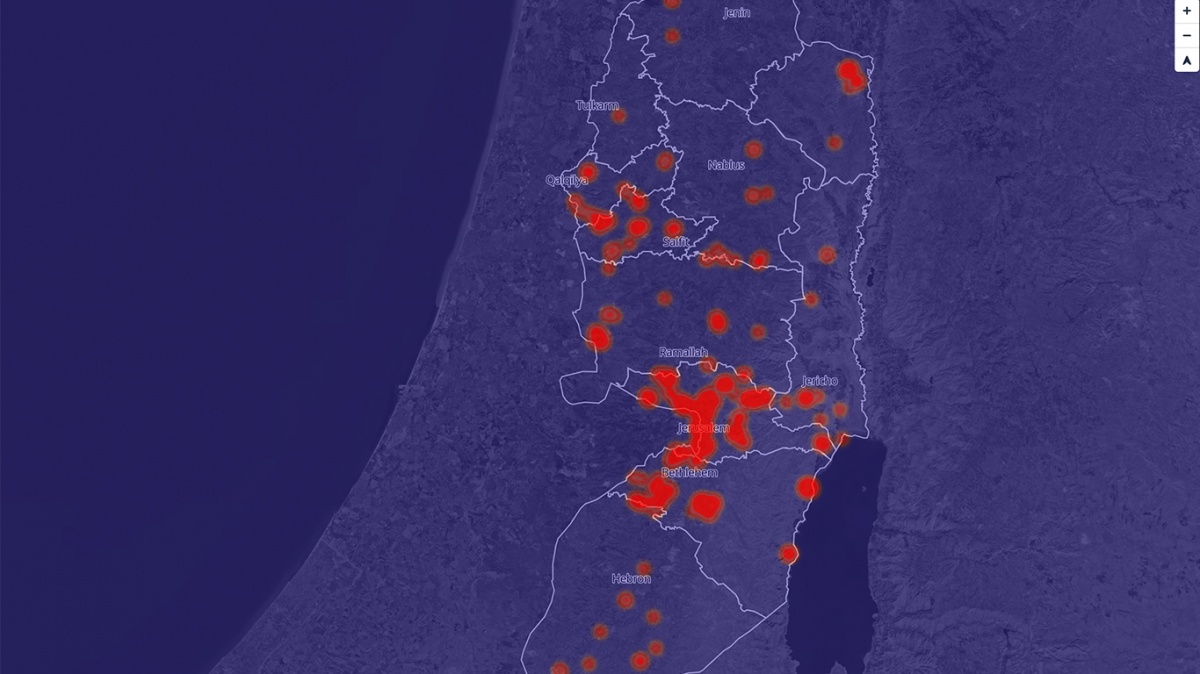
Heat map visualising the density of Airbnb listings within Israeli settlements in the occupied West Bank, highlighting the concentration of activity in these illegal settlements (2022). Source: geomolg.ps
The ease of commuting between Israel (inside the Green Line) and illegal settlements in the West Bank has made central settlements attractive for tourists seeking to visit major sites like the Old City of Jerusalem, Tel Aviv, and the Dead Sea. From settlements like Pisgat Ze’ev or the French Hill in Jerusalem, it takes only 20–30 minutes to reach Jerusalem’s Old City and roughly an hour to reach Tel Aviv or the Dead Sea.
Tourists also benefit financially: staying in these settlements costs $50–$60 less per night compared to accommodation in the Old City of Jerusalem. The combination of affordability, convenience, and a marketed “authentic” experience of the rural “Judea and Samaria region” – as Israelis often call the occupied West Bank – creates a strong appeal for tourists who lack the political and legal understanding of the illegal situation.
By listing rentals in illegal settlements and outposts built on stolen Palestinian land, Airbnb is upholding illegal settlement activity in Occupied Palestinian Territory and is thus further enabling the Israeli Government’s policy of transferring its population into occupied territory, a war crime under international law.[1] Airbnb is therefore in violation of the International Court of Justice’s Advisory Opinion finding that Israel’s presence in the occupied Palestinian territory is illegal, and calling on Israel to immediately cease all new settlement activities and evacuate all settlers from the oPt, repeal all legislation and measures creating or maintaining the unlawful occupation, as well as all measures aimed at modifying the demographic composition of any parts of the territory. Furthermore, Third States are required to not render aid or assistance in maintaining Israel’s illegal occupation.[2] As such, Airbnb’s rentals in illegal settlements open Airbnb up to liability for war crimes and maintaining Israel’s illegal occupation.
Binyamin Invites
Israeli settlements in the West Bank have been designated by the Israeli Government as “National Priority Areas”, which grants their residents significant benefits, including tax reductions, preferential land allocations for construction, and financial grants for businesses. Under the leadership of Yisrael Gantz, the Head of the Mateh Binyamin Regional Council—encompassing Shilo, Kida, Esh Kodesh, and other settlements in central West Bank— Gantz has leveraged these advantages to make local tourism a cornerstone of its development strategy.
Since assuming office in 2018, Gantz has prioritised the legalisation of settlements, the expansion of their jurisdictional boundaries, and the enhancement of transportation infrastructure. These efforts aim to integrate the Mateh Binyamin region and the broader West Bank into the fabric of the Israeli state. This strategy is evident in the transformation of outposts into settlements, the widening of roads, and the construction of new bypasses and underpasses to facilitate the seamless movement of settlers in and out of Jerusalem. These actions are part of the broader plans to illegally annex the West Bank, as Prime Minister Benjamin Netanyahu, Minister of Finance Bezalel Smotrich, and others in the Israeli government have repeatedly promised to do.
In a recent development, the Israeli Civil Administration announced its intention to include the Ahiya outpost within the jurisdiction of Shilo settlement. This move allows for the planning of the regularisation of the outpost, paving the way for its recognition as legal under Israeli law.
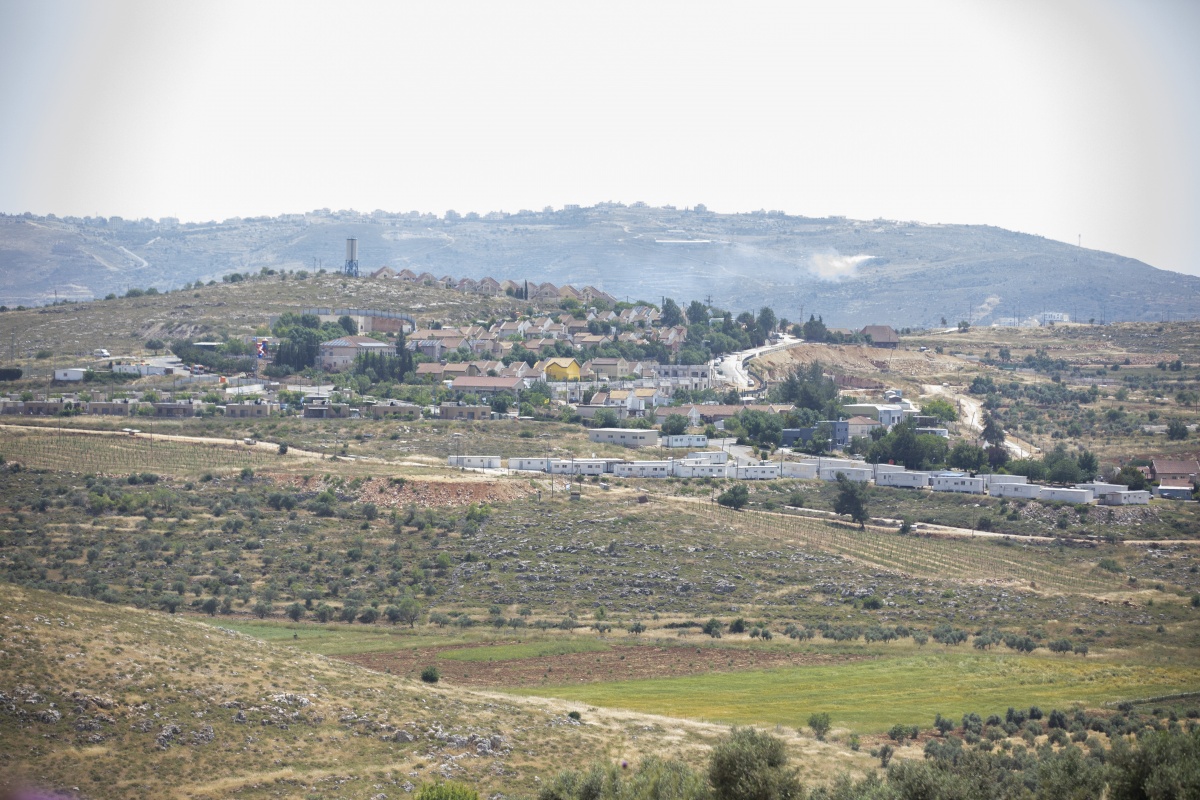
From the Palestinian village of Jalud, the Ahiya outpost, established in 1997, looms ahead, expanding Shilo Settlement’s jurisdiction. Source: Al-Haq (May 2023).
In 2020 and again in 2022, the Israeli government, under Prime Minister Benjamin Netanyahu, allocated dedicated budgets for advancing local tourism in Mateh Binyamin and adjacent regional councils—a first in the history of these settlements. This funding, combined with the efforts of civil society organisations like Lev HaOlam and The Heartland of Israel, has enabled small businesses in the settlements to flourish. These organisations actively promote settlement products and businesses, portraying them as part of a “heartland” narrative.
Today, one-third of Israeli settlers in the West Bank engage in small business activities similar to those of Maanit Rabinovich, who operates a glass art studio and promotes tourist accommodations on land expropriated from Palestinian residents. This model illustrates how local tourism, supported by the Israeli government and international platforms like Airbnb, is intricately tied to the economic sustainability of these settlements, reinforcing their presence and expansion on occupied land.
This symbiotic relationship between tourism, settlement expansion, and government support underscores the systematic integration of settlements into Israel’s economic and geopolitical framework. Through actions like the regularisation of outposts and the promotion of tourism-driven economic development, these policies perpetuate the illegal occupation, further marginalise Palestinian communities, encourage land theft, and prevent the realisation of Palestinian self-determination on their ancestral land.


